Arto's Blog
Pages: << 1 ... 19 20 21 22 23 ...24 ...25 26 27 ...28 ...29 30 >>
Holiday apartment at Sunny Beach
Posted: 2006-11-22 10:39:27, Categories: Travel, Bulgaria, Hospitality exchange, 563 words (permalink)
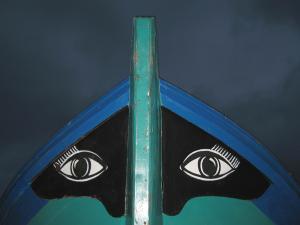 A couple of days after leaving Varna, a November heat wave arrived in
Bulgaria and we were enjoying 20 degree and even higher temperatures
for a few days. By accident we got also a holiday apartment near one
of the most famous beaches to match the weather.
A couple of days after leaving Varna, a November heat wave arrived in
Bulgaria and we were enjoying 20 degree and even higher temperatures
for a few days. By accident we got also a holiday apartment near one
of the most famous beaches to match the weather.
Both Bulgarian and Romanian parts of the Black Sea coast have plenty of beach resorts which attract a large number of tourists during the summer and become almost deserted in the winter. Especially in Bulgaria investors seem to believe that more money is still waiting for takers. Hundreds of new hotels, villas and apartment buildings are being constructed and roadsides are cluttered with advertisements of the real estate companies.
We had just decided to take a look at the beach at a resort called Sunny Beach, when a friendly Bulgarian couple in their fifties came to talk to us. They were fascinated about our trip and invited us to stay at their place if we had time. Well, we had. :) It turned out that our new friends who lived in Sofia had recently bought not only one but two holiday apartments in a nearby apartment complex and we were offered to borrow one of them. So after three nights of camping we had like a package holiday weekend: beach, sunshine, swimming, short walk to a shiny new two-room flat with all the modern comforts. Just the crowds were missing.
Actually better than the beach at least at this time of the year was the historic town of Nesebar, which was also just a short walk from Sunny Beach. Nesebar is famous for ruins of ancient churches built between the 6th and 14th centuries. Old wooden and stone houses along narrow cobblestone streets gave it a fairy-tale town feel, especially now during off-season when it wasn't filled with tourists. We also loved the small port full of bright colors: nicely painted fishing boats floating next to the graffiti decorated pier. The picture I chose for this blog entry is a front view of one of the boats at night. As the sugar on top, in a restaurant in Nesebar we tasted superb grilled bluefish, the best fish meal during the whole trip this far.
After Sunny Beach and Nesebar just 20 km along the coast we found one of the best camping places on the trip. It was on the sea shore less than a kilometer from the main road, but nicely hidden so that we didn't need to worry about getting unexpected visitors. The sea had carried plenty of loose pieces of wood on the shore, so we made a campfire and sat around it listening to the sound of waves hitting the nearby rocks. The holiday apartment had been nice, but camping at that place still felt more like a traveler's way to live. We had even one more guy to chat with: another Lithuanian friend who traveled five days by bus and train to meet erte.
Yesterday we arrived in Burgas, walked around in the city a bit and went to a salsa party in the evening with a local Hospitality Club member. The city tour itself was not terribly interesting (except for the seaside park and the party, which were nice) but we met Emile, a 51-year old Belgian cyclist who's also on a long tour. So now we are three, heading towards Istanbul together.
Romania and Bulgaria joining the EU
Posted: 2006-11-13 19:36:47, Categories: Travel, General, Romania, Bulgaria, 722 words (permalink)
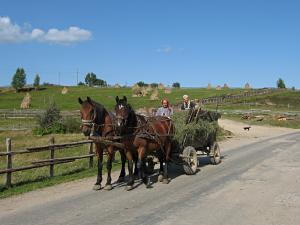 Both Romania and Bulgaria will join the European Union from the
beginning of year 2007. On the streets it hasn't been much visible
except for various signs telling about EU supported renovation and
construction projects, but in conversations it's naturally a hot
topic.
Both Romania and Bulgaria will join the European Union from the
beginning of year 2007. On the streets it hasn't been much visible
except for various signs telling about EU supported renovation and
construction projects, but in conversations it's naturally a hot
topic.
In both countries people in cities seems to be generally optimistic but there are also many who aren't really happy about the whole process. The marketing folks touted about more prosperity and other advantages, while critical voices during the negotiation process were few and far between. As the big date approaches also the less rosy aspects of EU integration are becoming more apparent.
Prices are rising, people say, while salaries are not. In particular property prices have climbed out of reach from ordinary people trying to save towards an apartment or house. After the collapse of communism apartments were generally given to the people living in them. Therefore most people have a place to stay, but for a young couple wishing to start a family the situation is difficult. Beneficiaries have been mostly the rich who have been able to work through corrupted municipality administrations. They are building ugly-looking but luxurious hotel complexes in places of natural beauty, eagerly waiting for new tourists.
EU will also impose new rules on the production of food, taxes on home-made alcohol and possibly outlaw certain traditional dishes. Otherwise most wouldn't care much of the whole EU thing, but invasions to the traditional ways of life is making people angry. Bulgarians have named their chief negotiator "the yes lady", saying she gave up too easily to all EU demands in order to guarantee the acceptance of Bulgaria for integration.
More positive changes brought by EU include efforts to reduce corruption, to fight organized crime, to increase transparency in the justice system and to improve the rights of ethnic minorities. There are also EU requirements concerning waste management and environmental protection which will hopefully result in a healthier environment for everybody.
Most of the debate around EU is centered around money. That's not a surprise, as it's a primarily economy-driven union. There may be some hard times in the beginning, but I have no doubts that eventually it will bring more wealth to the new regions. A more subtle question are the changes it will bring to the lifestyle. It's good if everyday life will become a bit easier and people will have more choice what to do with their lives. On the other hand, if every horse cart will be replaced by a tractor, if people will get their wine from a shop instead of their own or friend's barrel, if shepherds won't be following their sheep over beautiful hilly grasslands any more, something important will be lost forever.
Of course a lot of the changes have already been happening and would happen also without EU. It's the result of entering market economy and global markets after a long period of communism. Joining the EU will just speed up the whole process. Many young people have already for years moved abroad to gain better salaries and virtually every family has some family members or close friends working outside their homeland. EU will obviously make this even easier and it remains to be seen how many will return.
A detail which several Romanians mentioned to me is that while several Western European countries put restrictions on work permits for people coming from new EU member states, Finland decided to open doors for everybody. Traditionally Finland has been quite restrictive towards immigration, so it's interesting to see that in this case we're more open than many other EU member states.
Travelers in both Romania and Bulgaria are happy that becoming an EU citizen will mean visa-free travel to a larger number of countries. Curiously the change is not so big concerning traveling in Europe - neither Romanians nor Bulgarians have required visas for most European countries for years - but several Asian, South American and African countries will become easier to access after joining the EU.
One small change we'll all notice is that new banknotes will carry the text EBPO in addition to EURO and EYPΩ. Bulgarians are proud to mention that the cyrillic alphabet was invented by them (not Russians) and now it will become the third official alphabet in the European Union. Cool. :)
Autumn weather on the Black Sea coast
Posted: 2006-11-08 13:57:15, Categories: Travel, Romania, Bulgaria, 461 words (permalink)
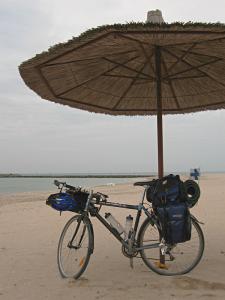 After Tulcea the weather started getting colder and windier. On the
first day we enjoyed roads lined with colourful trees with the wind
pushing us forwards. The following day we occasionally struggled to
advance even at walking speed while being beaten by a shower of
vertically flying sand from a nearby field. There was also some rain,
although mostly at night time. We passed many beautiful beaches but
didn't really feel like swimming. Riding through beach resort towns
was like trespassing abandoned land.
After Tulcea the weather started getting colder and windier. On the
first day we enjoyed roads lined with colourful trees with the wind
pushing us forwards. The following day we occasionally struggled to
advance even at walking speed while being beaten by a shower of
vertically flying sand from a nearby field. There was also some rain,
although mostly at night time. We passed many beautiful beaches but
didn't really feel like swimming. Riding through beach resort towns
was like trespassing abandoned land.
When entering Bulgaria it got even better: rain turned into sleet. After that the sun came out again and it all looked like a beautiful summer day - except that we were wearing all our clothes. One night we camped on cape Kaliakra and left a kettle half full of water outside during the night, discovering a thick layer of ice on top in the morning. I'm carrying a lightweight sleeping bag and it was approaching the limits of comfort.
Other than the coldness, cape Kaliakra was one of the most gorgeous camping places ever. We pitched our tents on a patch of grass just a few meters from a vertical drop of several dozen meters down to the sea. Full moon was casting a path of light on the water in front and ancient ruins provided wind protection in the back. I guess camping there wasn't officially permitted, but it wasn't explicitly forbidden in the rules of the area either. ;-)
My average daily cycling distances have become shorter than in the beginning of the journey. It's partly because Erte's riding speed is a bit slower than mine and we are making a lot of stops for taking photos, but mainly because the days have become shorter. Already before five o'clock in the afternoon we need to start thinking about where to stay. The sun sets after five and by six it's already dark. By going south I can maybe avoid snowstorms but cannot enjoy such long days as during summers in Northern Europe. Or at least to do that I'd need to go far, far further south.
Bulgarian part of the Black Sea coast is more hilly than the Romanian one. The vegetation is thicker and more lush, hinting we're in a warmer zone even though the temperature hasn't given that impression all the time. However, the biggest change has been the language. Romanian is based on Latin and I was able to pick it up a little bit during my stay there. Bulgarian belongs to the group of Slavic languages, which makes communication easier for Erte who speaks Russian but harder for me. At least I finally made the effort of learning the cyrillic alphabet so that I can read signs and other texts here.
Observing life in Danube Delta
Posted: 2006-10-29 11:07:17, Categories: Travel, Romania, 525 words (permalink)
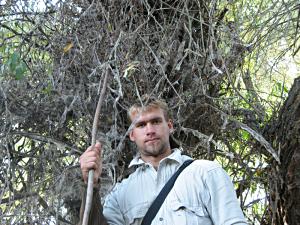 My next destination after Moldova was Danube Delta, a labyrinth of
canals and lakes in the area where the Danube river flows into the
Black Sea. I went there with Erte, a Lithuanian friend I already
mentioned last time I wrote. We slightly changed plans so that he
didn't eventually come to Bacau. Instead, we both headed further south
to Galati, met there and continued to Tulcea where the delta begins.
There we left our bikes in storage for a couple of days and used boats
and our feet to move around.
My next destination after Moldova was Danube Delta, a labyrinth of
canals and lakes in the area where the Danube river flows into the
Black Sea. I went there with Erte, a Lithuanian friend I already
mentioned last time I wrote. We slightly changed plans so that he
didn't eventually come to Bacau. Instead, we both headed further south
to Galati, met there and continued to Tulcea where the delta begins.
There we left our bikes in storage for a couple of days and used boats
and our feet to move around.
The Danube delta is especially known as a birdwatchers' paradise and for locals the first question is "How much fish did you get?". We were a bit late for the best bird season and not very interested in fishing, but discovered that the delta is also full of other lifeforms. Hundreds of frogs were jumping to the river and taking a swim before climbing back on the riverbank. A snake wiggled between exposed tree roots and performed artistic movements when I pointed my camera at it. Cows strolled around freely between bushes by the coast of the Black Sea. Fishermen were trying to catch the biggest pikes and other fish with their rods and reels.
Other highlights on our trip to the delta:
- Renting a small motor boat in Crisan, exploring the canals for a day and rowing back under the stars after the engine died
- Enjoying a free dinner (fish, of course) and accommodation in a pension after the boat trip
- Arriving to the Black Sea in Sulina, declaring it as a nude beach and rushing to swim
- Camping on the beach and waking up at seven to take photos of the sunrise
- Sharing meals with the captain of the houseboat where we stayed in Tulcea.
Before heading to the Danube Delta I spent a nice day with my friend Nelu from Bacau. We went about 25 km from the city to a small village called Magla, where I helped in picking grapes for one day. Like many Romanians Nelu also makes wine in his childhood home in the countryside. The house was small but beautiful and more than 100 years old. It currently mostly stays empty because Nelu's aging mother moved to an apartment in the city after the death of her husband some years ago. In addition to helping Nelu and seeing the village it was a great occasion to have an introduction to the traditional method of winemaking.
Nelu also gave me a suprise present: during my trip to Moldova he had completely cleaned my bike and oiled the moving parts. I'd be lying to say the bike runs as well as new - the age shows in some parts - but it's about as good as it was when I started my trip.
Today I'll continue with Erte towards south, where we should again reach the sea coast, this time by bike. Erte is not very eager to spend money on accommodation so it means more camping than earlier during my trip. On the other hand I have now good company which makes camping nicer than it would be alone.
Wine with friends in Moldova
Posted: 2006-10-17 20:47:02, Categories: Travel, Moldova, Cycling, 907 words (permalink)
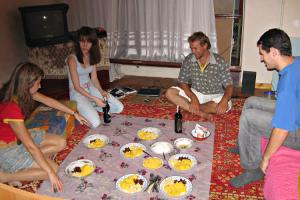 My trip to Moldova was great. It was originally
planned to last for one week but became 12 days of having good time
with friends, seeing some extraordinary places and tasting local
delicacies, naturally including several different variants of world renowned Moldovan wine.
My trip to Moldova was great. It was originally
planned to last for one week but became 12 days of having good time
with friends, seeing some extraordinary places and tasting local
delicacies, naturally including several different variants of world renowned Moldovan wine.
Getting to Chisinau (the capital of Moldova) from Iasi (in Romania) was a bit chaotic. I had checked at the bus station that there should be a bus at 14:00. However, at the information desk people instructed me to go 1 km away to a parking lot used by minibuses. The minibus driver wouldn't take me because I didn't have a visa and pointed that I should go with another man in a normal car. They said that the nearest border crossing used by the minibus wouldn't have a consulate, although I had checked from the web that there should be one. It all sounded exactly like an arrangement to rip off stupid tourists, but at least I got a fairly reasonable price quote of 35 lei (10 euros) which I wrote on a piece of paper.
In roughly an hour the man got the car full of other passengers (which were all Moldovans) and started the car. After that everything went fine. At the border crossing a young officer kindly instructed me to write "National day of wine" as the purpose of my visit, and I got a visa for 19 days free of charge immediately on the spot. Questions about a return ticket (which I didn't have), the amount of currency I had or other things mentioned in the visa formalities weren't asked. In Chisinau the driver offered to take me to any location I wanted and the price was the one agreed at the time of departure. My first evening in Moldova ended with a delicious meal with friends. The food was mamaliga, a corn based traditional dish in Romania and Moldova, served with meat, fresh cheese, smetana, garlic and wine.
The wine festival was a two-day event where all the major wine producers would come to city center to present their products. There was also a stage with traditional music and dance performances. The festival was mostly to celebrate new wine which some stands offered for free, others charging nominal amounts such as one Moldovan lei (about 0.07 euros) per cup. Older wines were available in bottles but I was a bit surprised that there wasn't any organized tasting of them. Perhaps it took place in some of the restricted areas which seemed to welcome mostly invited guests dressed in suits. Well, we shopped a variety of snacks from the long array of food stands and shared a bottle of 1994 Cabernet (about 2.5 euros) for lunch.
The most special place during my visit in Moldova was Orheiul Vechi. It's an almost 1000 year old cave monastery about 60 km north from Chisinau. The monastery itself was interesting but the real treat was the location. The monastery cave was situated near the top of a hill surrounded from three directions by a deep valley. A river flowed slowly in the bottom of the valley. The views from the monastery hill as well as from the cliffs on the other sides of the valley were fantastic. Surrounding villages were some of the pretties I've seen on the whole trip, with colourful houses, gardens and wineyards.
I went to Orheiul Vechi together with Erte, a Lithuanian guy who had come to Moldova by bicycle through Belarus and Ukraine. I had left mine in Bacau but borrowed a bike from one of my friends in Chisinau. We spent the first night in Erte's tent camping by the river, but on the second day asked the monk in the cave church if we could stay in the monastery. He welcomed us there and we had an unforgettable evening first cooking dinner outside on the stone terrace in moonlight, and after that listening to the monk's apocalyptic visions of the future inside the church. He was talking in Russian and Erte translated for me. We slept on the church floor and woke up to the morning ceremony conducted by the monk and a woman who apparently also lived there.
To be honest I had slightly higher expectations for the wine festival but Orheiul Vechi and other things more than made up for it. We went for walks and to see some nightlife in Chisinau with Natalia, one of the friends I had met in Slovakia, and a few other friends. Later she invited me and Erte to spend a couple of days in her small town where she lived with her parents. There it seemed that we were eating all the time, but a peek in the cellar assured us that we wouldn't be making a too big hole in their stocks for the winter. They also had home made wine as almost all Moldovans in the countryside seem to do - it's a pride of the country. If you're traveling there just ask around in a village and people will be happy to sell you some for around 0.5 euros per liter. Having a chance to visit the wine cellar and taste their best stuff is another story, that's kept for family and friends.
Now I'm back in Bacau in Romania and will stay for a couple of days waiting for Erte who'll make the trip here by bicycle. Then we plan to travel together for some time, maybe until Turkey.
Added 2007-03-22: See also the picture gallery.

Copyright Arto Teräs <ajt@iki.fi>, licensed under the Creative Commons Attribution-Share Alike 3.0 Unported License. (Unless otherwise mentioned in individual photos or other content.)